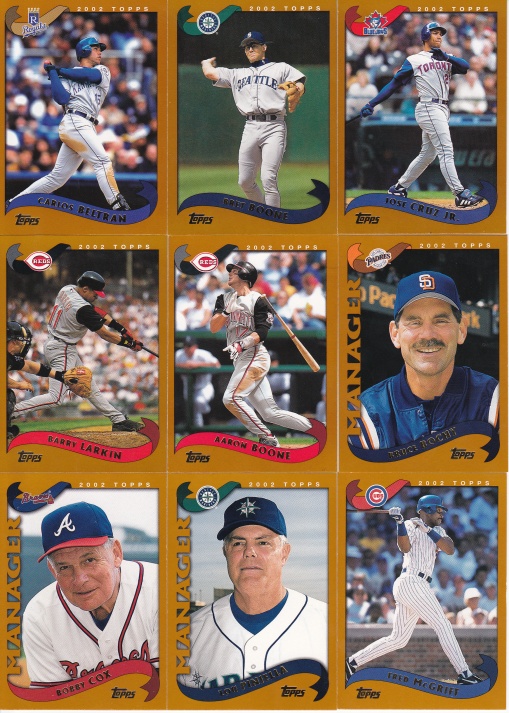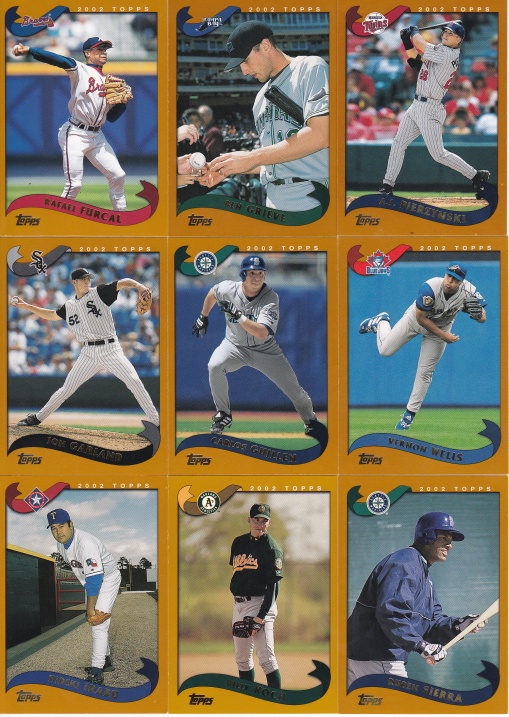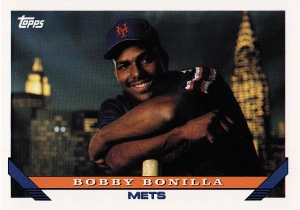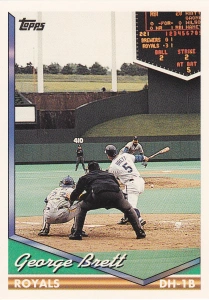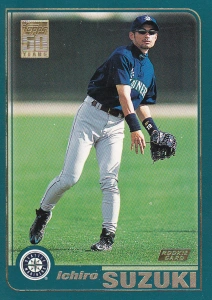 All-Star Game: AL ties NL, 7-7 at Miller Park in Milwaukee, WI (No MVP awarded)
All-Star Game: AL ties NL, 7-7 at Miller Park in Milwaukee, WI (No MVP awarded)
Home Run Derby: Jason Giambi 24 – beat Sammy Sosa, 7-1 in the final (AL over NL, 41-31)
ALDS: Anaheim Angels over New York Yankees, 3-1
Minnesota Twins over Oakland A’s, 3-2
 NLDS: San Francisco Giants over Atlanta Braves, 3-2
NLDS: San Francisco Giants over Atlanta Braves, 3-2
St. Louis Cardinals over Arizona Diamondbacks, 3-0
ALCS: Angels over Twins, 4-1
NLCS: Giants over Cardinals, 4-1
World Series: Angels over Giants, 4-3
**********
MVP: AL – Miguel Tejada, SS, Oakland A’s (.350/34/131, 204 H)
NL – Barry Bonds, OF, San Francisco Giants (.370/46/110, 198 BB (MLB record), 68 IBB (MLB record), .582 OBP (MLB record), .799 SLG, 1.381 OPS (MLB record))
Cy Young: AL – Barry Zito, SP, Oakland A’s (23-5/2.75/182)
NL – Randy Johnson, SP, Arizona Diamondbacks (24-5/2.32/334, 260 IP, 8 CG, 4 SHO)
RoY: AL – Eric Hinske, 3B, Toronto Blue Jays (.279/24/84)
NL – Jason Jennings SP, Colorado Rockies (16-8/4.52/127)
**********
MLB Amateur Draft:
Bryan Bullington, P, PIT (1st overall pick)
B.J. Upton, OF, TBD (1st #2)
Zack Greinke, P, KCR (1st #6) – 2009 AL Cy Young, 2009 AL ERA champ, 2x All-Star, 128 career W
Prince Fielder, 1B, MIL (1st #7) – 2007 NL HR Champ, 2009 NL RBI Champ, 290 career HR, 5x All-Star
Nick Swisher, 1B, OAK (1st #16) – 1x All-Star, 239 career HR
Cole Hamels, P, PHI (1st #17) – 3x All-Star, 109 career W, 2008 NLCS & WS MVP
Matt Cain, P, SFG (1st #25) – 3x All-Star, pitched perfect game in 2012
Joey Votto, C, CIN (2nd #44) – 2010 NL MVP, 4x All-Star, 4x NL OBP champ

Jon Lester, P, BOS (2nd #57) – 3x All-Star, 118 career W
Brandon Weeden, P, NYY (2nd#71) – 2012 First team all Big 12 Football, 22nd pick in 2012 NFL draft

Curtis Granderson, OF, DET (3rd #80) – 3x All-Star, 20-20-20-20 (doubles-triples-HR-SB) in 2007 (one of 4 ever), 2x AL triple leader
Russell Martin, 2B, LAD (17th #511) – 3x All-Star
Jacoby Ellsbury, OF, DET (23rd #674) – 1x All-Star, 3x AL SB leader, 30-30 in 2011
Hunter Pence, OF, MIL (40th #1189) – 3x All-Star
Jonathan Papelbon, P, OAK (40th #1208 – did not sign) – 5x All-Star, 330 career SV, 8x 30 SV
 **********
**********
Hall of Fame: Ozzie Smith, SS, St. Louis Cardinals, San Diego Padres (1st ballot)
**********
Batting Leaders:
Avg. (AL) Manny Ramirez BOS .349, (NL) Bonds SFG .370
HR (AL) Alex Rodriguez TEX 57, (NL) Sammy Sosa CHC 49
RBI (AL) A. Rodriguez TEX 142, (NL) Lance Berkman HOU 128
R (AL) Alfonso Soriano NYY 128, (NL) Sosa CHC 122
SB (AL) Soriano NYY 41, (NL) Luis Castillo FLA 48
H (AL) Soriano NYY 209, (NL) Vladimir Guerrero MON 206
Pitching Leaders:
W (AL) Zito OAK 23, (NL) Johnson ARI 22
ERA (AL) Pedro Martinez BOS 2.26, (NL) Johnson ARI 2.32
K (AL) Martinez BOS 239, (NL) Johnson ARI 334
SV (AL) Eddie Guardado MIN 45, (NL) John Smoltz ATL 55 – NL Record
**********
Trends and Stats:
6 players above .330 AVG, 1 above .350 AVG
28 players above 30 HR, 8 above 40 HR, 2 above 50 HR
36 players above 100 RBI, 8 above 120 RBI
0 players above 50 SB
5 players above 200 H
7 pitchers above 20 W
7 pitchers above 200 K, 2 above 250, 2 above 300 K
11 pitchers below 3.00 ERA, 2 below 2.50
2 pitchers above 250 IP
10 pitchers above 40 SV, 2 above 50 SV
**********
I’ll post my standard All-Star selections and compare to the silver slugger winners for the year in the next post.




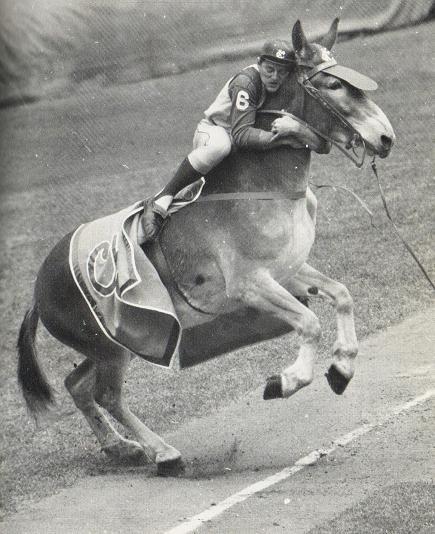


























 Outside of the Bronx, you didn’t need a high payroll to win in the American League. The A’s and the Twins were the other 2 division winners, despite being in the bottom 4 in MLB payroll. That Oakland season was the focus of the movie Moneyball; Oakland matched the Yankees with 103 wins. Billy Beane had to replace 3 of their best players, losing Jason Giambi to the Yankees, Johnny Damon to the Red Sox and closer Jason Isringhausen to the Cardinals. He replaced them through a now-famous strategy to find value for the right price. They had 2 remarkable streaks, winning 16 of 17 games over a stretch in June and then winning an AL record 20 games from mid-August into September. They ended with the 2 key Award Winners – Barry Zito won 23 games to take the Cy Young, and shortstop Miguel Tejada won the MVP with a solid (but not really MVP-worthy) season.
Outside of the Bronx, you didn’t need a high payroll to win in the American League. The A’s and the Twins were the other 2 division winners, despite being in the bottom 4 in MLB payroll. That Oakland season was the focus of the movie Moneyball; Oakland matched the Yankees with 103 wins. Billy Beane had to replace 3 of their best players, losing Jason Giambi to the Yankees, Johnny Damon to the Red Sox and closer Jason Isringhausen to the Cardinals. He replaced them through a now-famous strategy to find value for the right price. They had 2 remarkable streaks, winning 16 of 17 games over a stretch in June and then winning an AL record 20 games from mid-August into September. They ended with the 2 key Award Winners – Barry Zito won 23 games to take the Cy Young, and shortstop Miguel Tejada won the MVP with a solid (but not really MVP-worthy) season.
